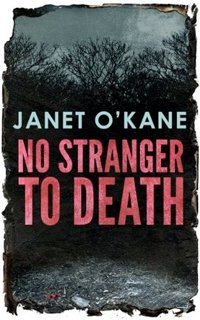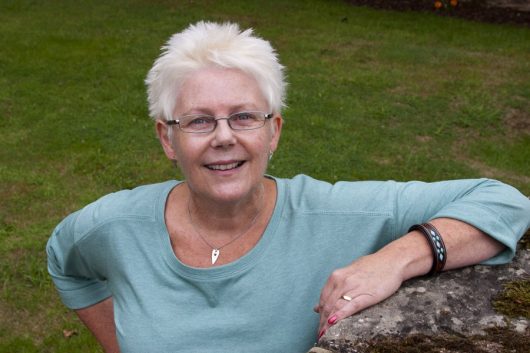
If you’re looking for an alternative to the grim urban settings that predominate in Scottish crime fiction, then self-published author Janet O’Kane is one to try. Her first book No Stranger to Death offers a gentler setting – the Scottish Borders – but at the same time she’s not afraid of social commentary and the book contains some nasty surprises which upset life in a claustrophobic village environment.
In the year since it came out, the book has won a number of self-publishing awards and was one of the most-borrowed titles in the Scottish Borders libraries. It’s an enjoyable and accomplished debut, described as ‘cosy with bite’, so we decided to find out more about the author…
Please can you tell us about No Stranger to Death?
Recently widowed doctor Zoe Moreland has relocated from an English city to the Scottish Borders countryside. Her hopes of a quiet life are dashed when she finds the grisly remains of a woman’s body in the village’s Guy Fawkes bonfire and gets caught up in the resulting murder investigation. When someone else dies unexpectedly and Zoe herself narrowly escapes death, she’s forced to dig beneath the tranquil surface of the close-knit community to find out who is committing these horrible acts. So far, so cosy, you may think, but although No Stranger to Death has a rural setting, it’s actually a bit grim in places and deals with dark themes. Maybe it should be called a tartan cosy?
How you come to being a crime fiction author?
Like every writer I know, I was an avid reader from an early age and remain one to this day. I was an only child brought up in the 1960s on a farm in Dorset, with few distractions to take me away from my books. When I was ready to move on from Enid Blyton and the like, my mum handed me what she enjoyed reading: crime fiction. I devoured work by Christie, Sayers, Marsh and Allingham, then moved on to crime novels by all the other writers I could find.
Fast forward a few decades and I still read crime but live in Scotland. At the local pub’s Bonfire Night party I mused that such a big bonfire would be a good way of disposing of a dead body and my husband said, “Write it.” So I did. Although, of course, it wasn’t nearly as easy as that sounds.

What made you decide to have a doctor rather than a police inspector detective as your main protagonist, and was there any real-life inspiration for your main character?
One of the best jobs I ever had was at a GP practice. The experience had a lasting effect on me and I came to admire the doctors I worked with. As well as handling patients’ day-to-day health matters, GPs often deal with people in extremis, helping them cope with whatever life throws at them and hearing things they can’t tell anyone else. I didn’t base Zoe on those doctors specifically, but I liked the idea of having a main character who knows other people’s secrets and is bound by confidentiality not to share them. And we all know that secrets are a vital ingredient in crime fiction.
Years ago I had the first few chapters of my book appraised by an established crime-writer. She suggested that Zoe should be a detective, but that wasn’t the story I wanted to write. I love reading police procedurals but there are lots of authors writing brilliant ones – I just wanted to do something different. Which is probably why my book is hard to classify and why I couldn’t find an agent to take it on. Thankfully, readers seem to enjoy following a mystery from an unusual viewpoint.
What authors would you say have influenced you most?
My answer has to be everyone whose work I’ve read, even if I haven’t enjoyed it. I don’t see any direct influences in my writing – maybe others can – but all the books I’ve consumed must contribute to how my brain processes ideas and transforms them into words on a screen. I read very widely within the crime genre. As well as being fond of traditional storytellers like Robert Goddard, I enjoy fast-moving thrillers by writers like Simon Kernick and the black humour of Christopher Brookmyre.
What made you decide to self-publish and what are the lessons you have learnt from that process?
How long have you got? To cut a long story short, a rejection from an agent who had read my manuscript convinced me to do something I’d been considering anyway. She told me No Stranger to Death was ‘very good’ but also ‘too mid-list’ to attract a publisher in the current climate. I chose to see this in a positive light and decided to find the book’s audience myself.
I’ll mention just three of the many lessons my experience so far of self-publishing has taught me. Firstly, the term is a misnomer: no one’s good at everything, so I bought in design, editing and formatting expertise to create a book I can feel proud of. Secondly, there’s no quick fix or magic bullet that brings sales, and different promotional methods work for different people. I’ve chosen how I do things, for example I rarely send out buy-my-book tweets, but that doesn’t mean I’m right and others are wrong. And finally, I’ve learnt there’s nothing to equal the delight of having someone say they enjoyed reading my book.
What’s next?
I plan to publish the sequel to No Stranger to Death next year, which opens with the discovery of a teenager’s body thrown off a historic bridge over the River Tweed. Zoe is still dealing with the aftermath of events of the previous winter but her job once again brings her into contact with the investigation. After that, I have lots of ideas for more books. These include the story of a serial killer who’s had several others ‘taking the rap’ for his crimes, and a murder mystery set on the Borders coast at St Abbs, where visitors come to scuba dive.
To discover more new blood crime authors, click here.










